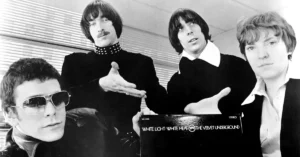Cat Stevens: The Poet of Peace, Transformation, and Song
Cat Stevens. I. Early Life and Musical Beginnings
Real name: Steven Demetre Georgiou
Born: July 21, 1948 – London, England
Heritage: Greek-Cypriot father and Swedish mother
Growing up in London’s West End above his family’s café, young Steven was immersed in music, art, and spirituality. He taught himself piano and guitar, and was influenced by The Beatles, , Nina Simone, and early rock and roll.
✦ First stage name: Steve Adams, later changed to Cat Stevens, reportedly because a girlfriend said his eyes looked like a cat’s.
II. Early Pop Success and Near-Death Experience (1967–1969)
Cat Stevens was first discovered at age 18 and quickly became a teen pop star in the UK.
✦ Matthew and Son (1967)
- Title track reached #2 on the UK charts
- Known for its orchestral pop arrangements and witty social commentary
- Other hits: “I Love My Dog,” “Here Comes My Baby” (later a hit for The Tremeloes)
But his career was nearly derailed in 1968 when he contracted tuberculosis and a collapsed lung, leading to a year-long recovery and profound personal reflection. During this time, he re-evaluated his life and music, shifting from pop to a deeper, more folk-based style.
Cat Stevens. III. Artistic Rebirth: The Folk-Rock Years (1970–1973)
With a new spiritual outlook and stripped-down sound, Stevens launched one of the most celebrated runs in singer-songwriter history.
✦ Mona Bone Jakon (1970)
- Marked his folk-rock transformation, with producer Paul Samwell-Smith
- Contained the delicate hit “Lady D’Arbanville”
- Themes of love, loss, and simplicity
✦ Tea for the Tillerman (1970)
- A masterpiece of melodic introspection and philosophical yearning
- Key tracks:
- “Wild World” – A bittersweet farewell to love
- “Father and Son” – A generational dialogue of clashing values
- “Where Do the Children Play?” – Ecological and spiritual concern
- Achieved international acclaim and became a staple of the 1970s folk-rock canon

✦ Teaser and the Firecat (1971)
- Commercial peak
- Songs like:
- “Peace Train” – A global anthem of harmony
- “Moonshadow” – Hopeful and mystical
- “Morning Has Broken” – A hymn-like traditional song reinterpreted with piano by Rick Wakeman (of Yes)
✦ Catch Bull at Four (1972)
- Reached #1 on the Billboard charts
- More introspective and musically ambitious
Cat Stevens’ music of this era blended spiritual seeking, personal struggle, and universal questions, earning him worldwide popularity.
Cat Stevens. IV. Spiritual Search and Departure from Music (1976–1980)
By the mid-’70s, Stevens was growing disillusioned with fame. After nearly drowning while swimming in Malibu, he prayed for salvation — and soon after, he discovered the Qur’an.
In 1977, he converted to Islam and changed his name to Yusuf Islam.
By 1978, he had retired from music, auctioned off his guitars, and left the pop world to focus on:
- Charity, education, and humanitarian causes
- Founding Islamic schools in London
- Avoiding public appearances or recordings for nearly three decades
His withdrawal caused controversy and misunderstanding, but he remained committed to his faith and principles.
Cat Stevens. V. Return to Music: Yusuf Islam and Later Years (2006–Present)
✦ Comeback: An Other Cup (2006)
- First album under the name Yusuf
- Balanced spiritual themes with folk-pop arrangements
✦ Roadsinger (2009) and Tell ’Em I’m Gone (2014)
- Reflected on modern life, identity, peace, and continuity
- Collaborations with Richard Thompson and Rick Rubin
✦ The Laughing Apple (2017)
- Nominated for a Grammy
- Returned to Cat Stevens-style arrangements and lyricism
✦ Tea for the Tillerman² (2020)
- A full reimagining of his 1970 classic, re-recorded 50 years later
- Explored time, memory, and change with new perspectives
Under the name Yusuf / Cat Stevens, he has bridged his past and present, reuniting with fans old and new.
VI. Musical Style and Lyrical Themes
Cat Stevens’ signature sound combines:
- Acoustic folk, melodic pop, and Middle Eastern influences
- Gentle, expressive vocals
- Poetic simplicity with philosophical undertones
Recurring themes:
- Spiritual longing
- Peace, harmony, and justice
- Love, heartbreak, and family
- Self-discovery and transformation
VII. Legacy and Influence
Cat Stevens/Yusuf has sold over 60 million albums and is revered for:
- Songs that feel personal yet universal
- Bridging faith and art, East and West
- Inspiring artists such as Elliott Smith, Nick Drake, Ben Harper, and Iron & Wine
Awards and Honors:
- Rock and Roll Hall of Fame inductee (2014)
- World Award for Peace (2004)
- Grammy nominations and Ivor Novello awards
His music remains a touchstone of the 1970s singer-songwriter movement, with lyrics that continue to resonate with seekers, pacifists, and romantics alike.
VIII. Interesting Facts
- “Morning Has Broken” was originally a Christian hymn, but his version popularized it globally
- Yusuf was briefly banned from the U.S. in 2004 due to post-9/11 security fears, later lifted
- Despite long absences from the public eye, he maintains strong connections with fans through social media and charity work
- A musical about his life, Moonshadow, debuted in Australia in 2012




